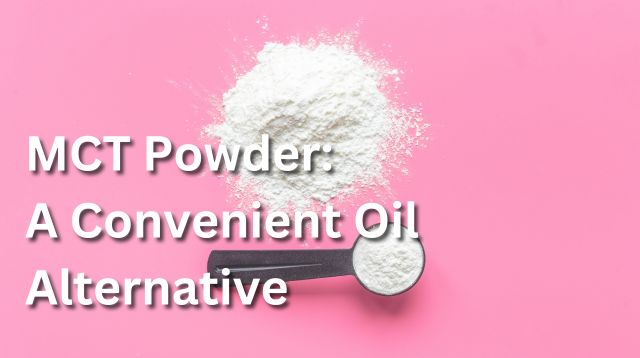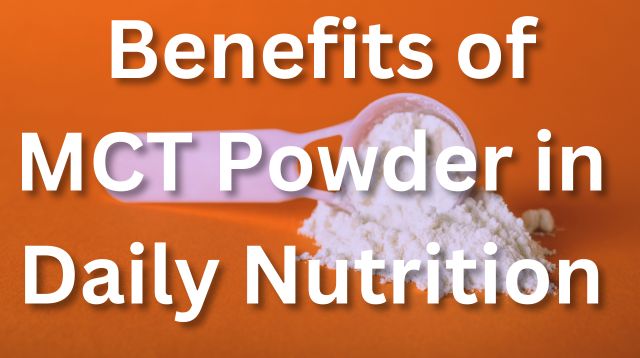Comparing MCT Oil vs MCT Powder

MCT oil, short for medium-chain triglycerides, is a popular dietary supplement derived from coconut oil and composed of medium-chain fatty acids (MCFAs). MCFAs have a shorter carbon chain length compared with long-chain fatty acids, found in most other fats and oils.
Just like its liquid relative, MCT powder is also formed from medium-chain triglycerides. It's created by taking MCT oil and turning it into a powdered form via a process known as spray drying.
Key Takeaways
- MCT oil and MCT powder may offer numerous health benefits, including weight management, increased energy, and greater mental clarity.
- Selecting a superior MCT supplement requires careful evaluation of the ingredients to ensure optimal results.
Exploring MCT Oil and Its Origins
MCT oil is composed of medium-chain triglycerides (MCTs), which are fatty acids with a shorter length than those found in long-chain fatty acids (like olive oil.) MCTs can be found in coconut or palm oil as well as in smaller amounts in some dairy products. They have no taste or smell making it very easy to incorporate into meals and drinks.
The Extraction Process of MCT Oil
The process of making MCT Oil from coconuts (the purest source of MCTS) involves several key steps.
- Fresh coconut meat is removed from the coconut.
- The “meat” is then put through either a wet or dry process. A “dry” method uses a small amount of heat to dry the flesh before a machine presses it to remove the oil. A “wet” method presses fresh coconut meat to obtain both milk and oil. The oil is then separated from the milk using centrifuge machines.
- Next, the coconut oil goes through a “fractionation” process where MCTs are pulled and isolated from the coconut oil.
Decoding MCT Powder: A Convenient Alternative
MCT powder vs oil is often a point of debate when it comes to MCT supplements.
However, for those who are always on the go, MCT Powder provides an easy (and less messy) alternative to the traditional liquid form. For some people, it’s also more comfortable on the stomach than MCT oil.
Transforming Oil to Powder
The production of MCT powder involves a spray drying process that converts liquid MCT oil into a solid while maintaining all the same benefits as MCT oil.
To become powder, MCT oil must be mixed with a carrier substance, usually, a starch like acacia fiber. This is so it can bind to something.
The mixture is then put through a spray drying process using specialized industrial equipment to “spray” the MCT mix into a chamber. It’s then exposed to hot air, which causes the liquid to evaporate and leaves behind fine particles of MCT oil powder.
The Versatility of MCT Powder
MCT powder is an easy-to-mix supplement, with a creamy texture. This makes it perfect for incorporating into one’s daily routine, especially if you don’t enjoy the “oiliness’ of MCT oil in your drinks. It can be seamlessly added to coffee, tea, or other favorite drinks.
MCT powder has quickly gained popularity as a great choice among those looking for health advantages alongside convenience. For those who frequently travel, MCT powder presents an easy alternative to messy or travel-banned liquids.
MCT Showdown: Oil vs Powder
When assessing which form of MCT to incorporate into your lifestyle and health goals, both offer unique advantages that cater to different preferences and needs.
These characteristics will help you decide whether an MCT oil or a powdered version fits best for your particular needs.
Characteristics
MCT powder and MCT oil are both made up of medium-chain triglycerides, a fat that's easily absorbed by the body. The key difference lies in the composition.
MCT oil is a pure, liquid source of MCTs, while MCT powder is combined with a carrier ingredient, such as acacia fiber, to bring it to a powdered form.
Potential Key Benefits
Both forms of MCT oil are fantastic sources of medium-chain triglycerides and both may provide a host of potential health and wellness benefits. These include:
- Healthy Brain Function. MCTs can stimulate the production of ketones which have shown promise for supporting healthy brain function and may even offer some neuroprotective support.
- Focus and Concentration. MCTs have been shown to potentially promote better focus, concentration, and mental clarity.
- Weight Management. Studies suggest that MCTs may lead to greater energy expenditure with the ability to boost the number of calories burned after meals. This may even help some people feel less hungry.
- Healthy Blood Glucose Levels. MCTs are quickly absorbed fats and some research suggests they may aid in supporting healthy blood glucose levels in already healthy people.
MCT Powder And Mitochondrial Uncoupling
Unlike any other fat, MCT oil is absorbed directly through the wall of your gut into your bloodstream and goes directly into your liver. In the liver, MCT oil is converted into ketones, and ketones are what stimulate mitochondrial uncoupling.
In a landmark 2008 study, researchers at Columbia University compared two groups of overweight people eating a diet with the same number of daily calories with one critical difference: one group ate olive oil, the other group consumed MCT oil. Fascinatingly, the individuals who ate MCT oil generated more heat, burned more oxygen, and lost more weight than those who consumed olive oil.
If getting into ketosis and uncoupling your mitochondria is what you want, MCT oil is the way to go.
Tolerability
MCT oil is fairly well tolerated when the amount taken per day is as prescribed. However, some people may need to start at a smaller dosage until their body adjusts.
MCT powder, on the other hand, is often recommended for people who have a hard time comfortably consuming MCT oil - which may be more common in women. The powder is generally seen as more tolerable on the stomach.
Always consult your healthcare professional as to whether MCT is the right supplement for your health.
Portability and Convenience
MCT powder is a great alternative to MCT oil since it provides portability, convenience, and easy transportation. It can be stored in small containers which is more convenient for those on the move than an oil-based product. Its dry nature also ensures no leakage from transportable packages and avoids any potential issues with TSA liquid limits, if flying.
Overall, MCT powder is a more convenient travel option than MCT oil.
Ease of Mixing
MCT oil is best blended into various liquids, so the oil doesn’t separate too quickly.
MCT powder seamlessly blends into both hot and cold drinks with the stir of a spoon. It’s often favored by those who don’t like the oily texture that MCT oil can add to a drink.
Other Uses
Aside from mixing with liquids, there are other uses that each variety excels at:
- MCT Powder can be more easily added to baking recipes without upsetting the liquid ratio.
- While MCT oil can more easily be drizzled over salads, vegetables, or added to marinades.
Selecting a Superior MCT Supplement
When selecting an MCT supplement, it is essential to choose one of high quality. Poorly produced items may contain fillers or other unhealthy ingredients.
For this reason, we’ve compiled some tips on how you can identify top-notch ingredients to guarantee an effective supplementation experience.
Evaluating MCT Concentration
Firstly, look for an MCT powder that’s made from 100% coconut oil. Avoid powders that contain palm oil. Next, you’ll want to check that the product contains only caprylic acid (C8) or a combination of caprylic and capric acid (C10) – the most potent MCTs.
Identifying Quality Ingredients
When selecting MCT supplements, ensure that the product contains natural ingredients and no suspicious additives.
MCT oil should only contain MCTs. That’s it.
MCT powder should contain MCTs and a suitable carrier powder or fiber such as acacia. Acacia fiber is a wonderful choice as it’s a natural “prebiotic” that can help to feed your friendly gut bugs.
However, MCT powder may also contain beneficial additives, such as antioxidants and bioflavonoids! These only add to the healthy benefits of the supplement.
Be cautious of powders with cheap binders like maltodextrin, sodium caseinate, and corn fiber. And if the powder is flavored, ensure that it only uses natural flavors.
Summary
MCT oil and powder are both excellent sources of fatty acids that may bring significant health benefits to the table such as weight management support, increased energy levels, and improved focus and concentration.
Although classic in its culinary uses, MCT Oil is often rivaled by the more convenient alternative – MCT Powder – which provides easier digestion and portability for those on the go.
Ultimately, choosing between MCT powder and MCT oil hinges on personal preference.
Frequently Asked Questions
- What's the difference between MCT oil and MCT oil powder?
MCT oil is a liquid form of potent MCTs extracted from coconut oil while MCT powder takes that oil and turns it into a powder for greater convenience. - What is the best form of MCT?
When seeking the best outcomes, choose an MCT oil that consists of C8 or a mix of C8 and C10. These are strongly viewed as the most potent MCTs as they have shorter chain length and therefore travel much faster through the body.
Choose only MCT oil derived from coconut oil. - Is MCT powder easier to digest?
MCT powder is often recommended for people who have a harder time comfortably consuming MCT oil. This appears to happen more commonly with women. The powder is generally viewed as being more tolerable on the stomach than the oil. - Who should not use MCT powder?
Before taking a new dietary supplement, you should always discuss it with a healthcare professional. This especially applies to those who have underlying health issues or are taking other medications. Your doctor is the best person to advise whether taking an MCT product is right for you. - How can I incorporate MCT oil into my diet?
MCT oil or MCT powder can easily be incorporated into your beverages and meals. Simply mix it into your morning coffee, or stir it into a salad dressing, soup, or broth. You can even add to your homemade protein bar recipes. Just ensure you don’t exceed the daily recommended dosage.
Related posts


